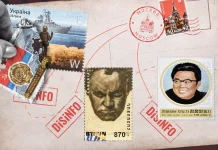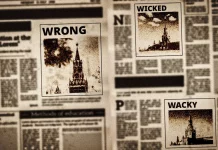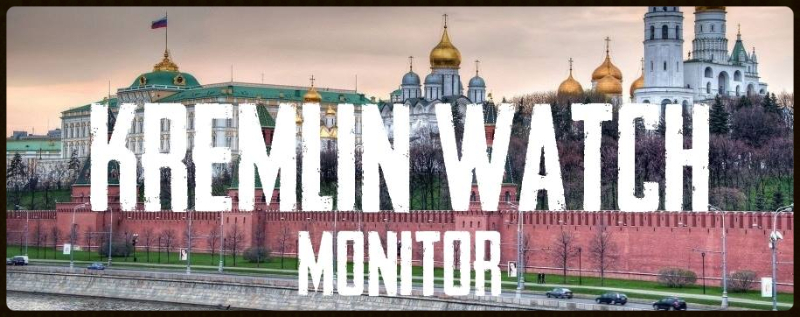
Invitation to the Expert Roundtable
How Europe sees Putin’s Russia
The purpose of this event is to discuss how various allied states perceive the threat which Russian Federation poses to European security infrastructure and internal affairs of Western democracies.
A new comparative study “How Europe sees Putin’s Russia” by the European Values Think-Tank will be presented. It will analyse security strategies, foreign policy strategies and annual reports of allied intelligence agencies of EU28 states through the lens of how these documents perceive behaviour of the Russian Federation.
The conference will be held under the patronage of Jaromír Štětina MEP, Vice-Chair of Security and Defence Subcommittee of the European Parliament.
Date and venue: 24 April 2017, room 3K002, European Parliament, Brussels
Confirmed participants include:
- Jaromír Štětina MEP, Vice-Chair of Security and Defense Subcommittee of the European Parliament
- Alina Polyakova, Deputy Director, Dinu Patriciu Eurasia Center at the Atlantic Council
- Roland Freudenstein, Policy Director, Wilfried Centre for European Studies
- Jakub Janda, Deputy Director of European Values Think-Tank
- Andreas Umland, Fellow, Institute for Euro-Atlantic Cooperation
- Anton Shekhovtsov, Visiting Fellow, Institute of Human Sciences
- Jaroslav Naď, Director, Slovak Security Policy Institute
- Joerg Forbrig, Senior Fellow, German Marshall Fund
- Ruslan Stefanov, Director of Economic Program, Centre for Study of Democracy
For more information and the registration form, please visit our website.
Putin’s Champion Award
Our Expert Jury consisting of Jessikka Aro, Anton Shekhovtsov, John Schindler and Michael Weiss regularly vote on the dangerousness of several candidates you can nominate via e-mail or Twitter.
This is the 7th Putin’s Champion Award Recipient:
Slovak Press Agency (TASR)
For trying to team up with Sputnik to “fight pro-Kremlin hoaxes”.
After a 24-hour public outcry, TASR cancelled the “content-sharing” agreement with Sputnik.
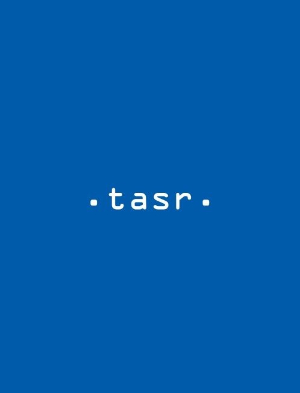
The Expert Jury ranked his Putin-supportive job with
4
(out of 5) mark.
The rating signals how much the recipient contributed to the interest of the Putin’s aggressive regime. It is calculated as an average of ratings assessed by the Expert Jury of this Award.
You can find more details about the award and the former recipients here.
Weekly Update on the Kremlin Disinformation Efforts in Europe
Our Open Letter of European security experts to Federica Mogherini calling for the High Representative to stop avoiding EU action against Russian disinformation campaigns has been featured in articles on Politico and the Foreign Policy.
Last week, this effort has been complemented by the European People’s Party which adopted a resolution on “Russian disinformation undermining Western democracy” at its annual congress in Malta. The resolution calls for enhancing funding and personnel of the EEAS East StratCom Task Force, establishing an effective strategy of communication of EU policies and values in the Eastern Neighbourhood, and greater coordination of European response and EU institutions including an establishment of specialized agencies in all Member States, as has recently been done in the Czech Republic.
Scepticism about how solid is the evidence of Russian meddling in the US presidential election increased as it turned out that the Crowdstrike cyber security firm misrepresented data published by the International Institute for Strategic Studies, a British think-tank, in its report assessing the hacking of the DNC.
Google made a new step towards countering disinformation on the internet and published its new guidelines for content-monitors which are supposed to help them mark questionable content – fake news, but also hate speech. The monitors are going to rate results of real search requests.
Kremlin Watch Reading Suggestion
Coverage of Angela Merkel in Some CEE Media; Beacon Project Insights
The Beacon Project is a transatlantic initiative for cooperation among experts, political and civil society representatives. It has been made possible through the funding of the National Endowment for Democracy and support of the International Republican Institute. As it takes a stand against internal and external threats to democracy, the initiative has identified one in particular as among the most poignant yet underreported – Kremlin’s attempts for clandestine subversion of transatlantic dialogue and of support for pluralistic democracy. The following case study has been conducted by participating organizations: GLOBSEC Policy Institute, Political Capital Institute, and European Values think-tank.
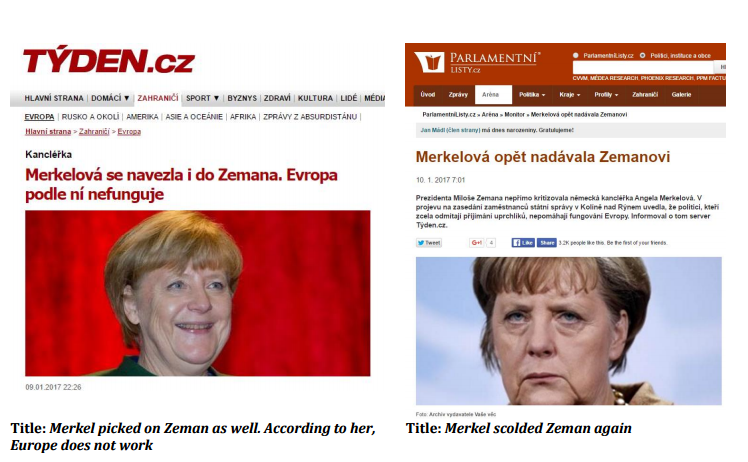
Recently the IRI together with GLOBSEC Policy Institute, Political Capital Institute, and European Values think-tank conducted a three-country survey (Czechia, Slovakia and Hungary) of the top narratives on Angela Merkel and the German elections in disinformation media. Analyzing the produced histograms and word clouds revealed the employment of hyperbolic, disingenuous or disinforming tools to stoke fear. While in Czechia the narrative focused on the migrant crisis, Slovakian outlets were more concerned with the US and anti-establishment themes. Hungarian articles concentrated on Merkel’s failure and emphasized AfD’s prospects. The survey found prevailing practices of cross-posting, copy-pasting of paragraphs and recurring titles.
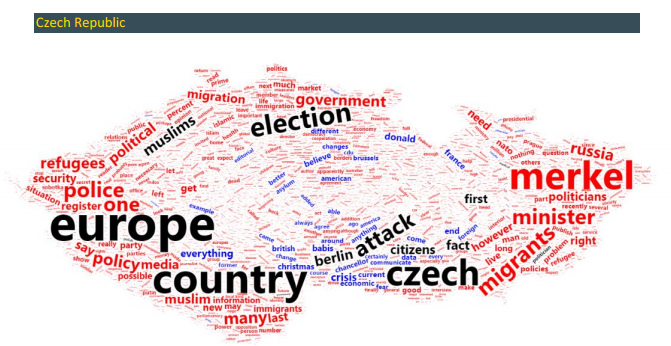
Read the full study here.
Euroatlantic experts on disinformation warfare
Did Russia manage to hack The Bundestag? German lawmakers and experts seem to be quite worried about it and warn that Russia might use the information it acquired before the elections, according to Janosch Delcker in his article for Politico.
The disinformation spread in the countries with upcoming elections like France and Germany has been widely under scrutiny, but let’s not forget the Baltics. Urve Eslas draws attention to Russian narratives undermining the independence of the Baltic States for CEPA.
Kate Starbird, an assistant professor at the University of Washington and an expert on crisis informatics, warns in her new paper about the risks of “emerging alternative media ecosystem” promoting anti-globalism, relativizing the truth and reaching a surprising number of recipients.
Steven Erlanger prepared a detailed profile of the Russian state television RT and its dangers to Western democracy for the New York Times.
Czech Disinformation Corner
We have no democracy in the West: According to one of the commentaries published by the Euserver website, Europe and the United States have never reached a state of democracy and the political parties with chances to gain power are ruled by hidden neo-feudals. The article warns especially against NATO and its alleged attempts to drag us into war. What real dangers NATO wants to protect us from, the author asks, since he believes it certainly cannot be Russia which “saved Crimea and Eastern Ukraine against destruction” and it is not the Islamic State either, because according to him, NATO helped create it.
Some disinformation never die: Even though the false reports connected with the so-called “pizzagate” already resulted in a tragic shooting, this fake story still lives in the Czech disinformation media, or at least on Aeronet website. While reporting on David Rockefeller’s death, the website reminded readers of the alleged transfusions with children’s blood helping rich elites stay young and live longer.
Twisting, twisting of the news everywhere: Svět kolem nás published a report that a well-known psychiatrist from Germany, Hans Joachim Maaz, asserted that the German Chancellor Angela Merkel has a mental disorder and suffers from narcissism. In reality, Maaz only expressed his disagreement with Merkel’s immigration policy in an interview for Zeit.
Kremlin Watch is a strategic program of the European Values Think-Tank, which aims to expose and confront instruments of Russian influence and disinformation operations focused against liberal-democratic system




